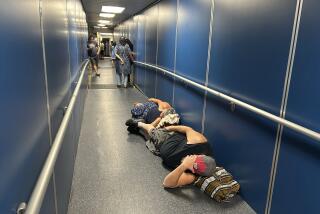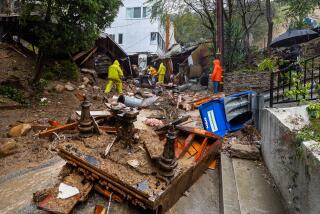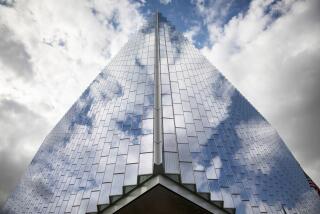East Coast Terror Halts Work, Play, Routines in West
- Share via
The governor shifted operations to a California Highway Patrol campus outside Sacramento. Disneyland closed and Madonna canceled. City blocks turned to concrete deserts as tens of thousands of workers evacuated office buildings across the state.
The terrorist attacks on the East Coast sent a cross-continental tremor throughout California, disrupting work, play and the millions of individual routines that make up a normal day.
In downtown Los Angeles, rush-hour traffic took a U-turn shortly after 9 a.m., leaving a swarm of police with little to do but cluster on abandoned street corners. Military personnel throughout California were placed on alert. State parks closed and major league baseball scrubbed its schedule, including the opener of a three-game series between Los Angeles and San Diego.
Hollywood came to a halt as every major studio shut down, along with the big talent agencies and the Screen Actors Guild. Production ceased on movies and TV shows such as “ER,” “X-Files,” “Ally McBeal” and “The West Wing.”
“It’s staggering. It should not be business as usual,” Universal President Ron Meyer said, a sentiment widely shared on a day when the world seemed to slip off its axis.
Airports across California were closed, stranding thousands of travelers.
Passengers in Oxnard looking for flights to Los Angeles lined up for rental cars instead. One customer opted to drive to Oklahoma. A couple from Canada weighed the prospect of a 32-hour ride to Edmonton.
“I don’t like flying anyway,” said 47-year-old Canadian Bruce Fox. He and his wife, Nanette, were on their first trip to the United States. “We were planning to leave Thursday, but my preference now is to drive,” Fox said.
Buildings in downtown Los Angeles and Century City were evacuated. The Getty Center closed and was expected to remain closed today. Movie theaters and even Starbucks coffee shops were shuttered.
Virtually all public offices--including federal, state and county courthouses--were abruptly closed. All but the federal buildings were set to reopen today; county employees were scheduled to return to work.
Los Angeles City Hall shut down for the day. Mayor James K. Hahn was on a four-day lobbying trip to Washington, where he monitored the situation from afar.
The special election for the City Council seat previously occupied by John Ferraro went on as scheduled. “We really owe a debt to the poll workers, who despite what was going on realized they had a civic duty and did their job,” Deputy City Clerk Arlene Taylor said.
Most Southern California schools remained open Tuesday, as did the University of California’s nine campuses. Public schools also remained open in Orange, Ventura, Riverside and San Bernardino counties, and some even held after-school sports matches as usual.
But all classes at Cal State University’s 23 campuses were canceled and “nonessential” employees were sent home; campuses were expected to reopen today. Chancellor Charles Reed said campuses would remain open for student residents, with heightened security.
Gov. Gray Davis ordered all state buildings to close and nonessential state employees to go home. They are expected back at work this morning.
As the first reports of terror arrived from the East early Tuesday, the California Highway Patrol scrambled its aircraft to secure the skies above the state Capitol, the California Aqueduct, the state’s electricity grid, nuclear power plants and other critical locations.
“Obviously, you could cause a major problem with water in Los Angeles if someone were to blow up the aqueduct,” CHP Commissioner D.O. “Spike” Helmick said.
Coincidentally, the San Onofre nuclear plant south of San Clemente was scheduled to conduct a disaster-preparedness exercise today. It was canceled.
The CHP also stepped up security for the state’s top elected leaders, including Davis, who was relocating some operations to CHP headquarters in West Sacramento. Buildings flanking the Capitol locked their doors, allowing only office workers inside.
“I made the recommendation . . . to err on the side of safety,” Helmick said of the unprecedented decision to set up gubernatorial shop outside the Capitol.
Davis dispatched urban search-and-rescue teams from Los Angeles, Sacramento and Riverside to help in New York and Washington. “I want to urge all Californians to be calm,” the governor said at a news conference on the CHP campus. “If they can, to spend this day with their family and, above all else, to say a prayer for the many victims of this dastardly act.”
Not everyone was pleased with the day’s heavy precautions.
Attorney Marshall Mintz was among those who arrived early to find the county courthouse in Santa Monica closed. “I don’t think it’s a high-priority target for terrorists,” said Mintz, 54. “I would think that terrorists would want to make a statement at other places in Los Angeles.”
Heather Whitmore, an attorney from Irvine, was less perturbed. “You don’t know what’s going to happen,” she said, as she rolled her briefcase back to the parking lot.
The building that houses the California Supreme Court in San Francisco was evacuated Tuesday. But Chief Justice Ronald M. George issued orders extending legal deadlines to account for the day’s courthouse closures.
One of the orders extended the deadlines for filing briefs and decisions at the court itself. George also extended the periods by which accused criminals must be arraigned and tried. That order was made possible after Davis issued an emergency proclamation.
Public facilities were opened and closed on something of a hit-or-miss basis.
While security was heightened at the Port of Oakland--the Bay Area’s busiest--the Port of San Francisco was closed entirely. Trains out of the Bay Area’s main station, in Oakland, were sold out for today.
The Port of Los Angeles shut down while the Long Beach port continued operations. One of Long Beach’s main tourist attractions, the Queen Mary, was open under heightened security. But the nearby Aquarium of the Pacific was closed.
The U.S.-Mexico border crossing between San Diego and Tijuana remained open, although federal agents were alerted to watch for any signs of terrorist activity.
Disneyland and the California Adventure theme parks in Anaheim were closed Tuesday, along with Universal Studios, Knott’s Berry Farm, Magic Mountain and the Los Angeles County Fair. The closure of Disneyland was only the second time ever and the first since President Kennedy was assassinated; it was scheduled to reopen today.
Maxine and Peter Bald of Australia showed up with their 16-year-old daughter, Erin. “I can’t believe we’ve come from the other side of the world and we’re going to sit in a hotel room,” Erin said. “I’ve only been waiting to go to Disneyland my whole life.”
Tuesday night’s Latin Grammys at the Forum in Inglewood were postponed, as were Sunday’s Prime Time Emmy Awards. Madonna canceled her sold-out Tuesday night show at Staples Center. Also canceled was the Fiesta of the Americas, which had been expected to draw 250,000 people to Santa Ana this weekend, and UCLA’s Saturday night game at the Rose Bowl against Arizona State.
Precious Hair & Nails in Los Angeles’ Miracle Mile District doubled as one of the city’s 101 polling places for the City Council election. Owner Veda Fields was alone Tuesday with a ringing telephone. Normally, she would have had 20 customers by mid-morning.
“I bet that’s another cancellation,” she said, before answering the phone. “I understand. I understand. I totally understand,” she told the caller, heaving a sigh as she hung up. “That was a cancellation for tomorrow. The lady said she . . . just wants to stay close to home.”
In San Francisco, landmark buildings were shuttered, including the Transamerica Pyramid and the Bank of America tower, the city’s tallest building.
The usually bustling Financial District was nearly deserted after workers began evacuating about 9 a.m. Dawn Marshall said that many were afraid because the World Trade Center attack occurred around the same time in New York. “It’s the time people go to work,” Marshall noted. “We all feel like potential victims.”
At City Hall, police kept all traffic at least a block away and spent the morning erecting metal barricades.
One woman approached an officer, wondering where she could deliver a package. “Lady,” he told her with a wave of his hand, “I wouldn’t be messing with any packages today. At least not around here.”
More to Read
Sign up for Essential California
The most important California stories and recommendations in your inbox every morning.
You may occasionally receive promotional content from the Los Angeles Times.














